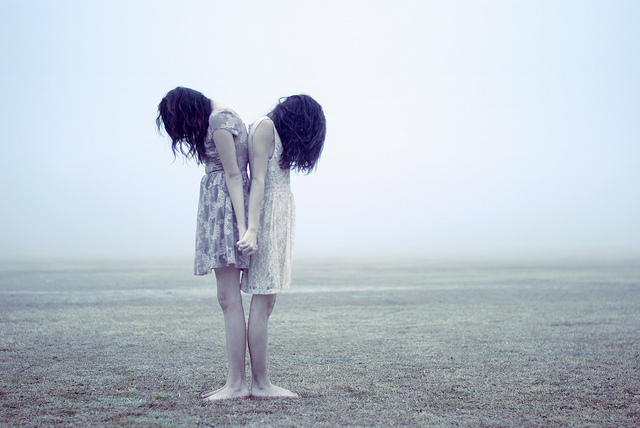
Shame is the second skin I’ve worn since I was small.
Abuse in my early childhood wrapped me in it, and it became so much a part of me I didn’t recognize it as foreign.
It shaped who I was day by day, as I bent under the weight of it. It influenced my decisions, it affected my relationships, and—more than anything else I can identify—it kept me from becoming the woman I was born to be.
Shame is insidious. It shape-shifts and shows up in all kinds of packages. I’ve had different names for these little packages over the years, but it’s taken a lifetime for me to connect them all back to their source.
Understanding the ways shame was manifesting in my experience has helped me heal and change old, destructive patterns.
Sometimes, shame feels like fear.
Fear of success, fear of intimacy, fear of rejection or failure. For me, the fear came from a deep-seated belief that I didn’t deserve anything good. This feeling of unworthiness kept me from going after the things I really wanted in my life. It allowed me to settle when I shouldn’t have. It made me feel like other people were entitled to things like wealth, happiness, love, and success—but I was not.
Because I didn’t feel worthy of all the good things in life, I found many ways to keep myself from them. I became my own worst enemy. I found ways to sabotage myself over and over. The worst part was, I didn’t even see that I was doing it. I thought things didn’t go my way because I didn’t deserve for them to. When good things started happening, I would subconsciously find ways to undo them. Each failure or loss reinforced my belief that I didn’t deserve anything good. And, each time something good came into my life, I spent every day in fear of losing it.
Sometimes, shame feels like guilt.
I spent years blaming myself for the bad things that happened to me when I was small. I believed that there was something wrong with me—an inherent flaw that made me deserving of abuse. I thought people hurt me because I was bad. And, if I didn’t deserve kindness from the people who abused me, I probably didn’t deserve it at all. I didn’t know what I did, exactly, but I always felt like the abuse was my fault.
I felt guilty for needing or wanting things. I felt guilty asking for even the most basic needs to be met. I felt guilty for wanting more than I had. I felt guilty for no reason at all—guilt lingered in the background of my life. It was always there with me.
Sometimes, shame inspires self-punishment.
I now recognize that shame was at the core of my self-harm cycles. I now see that these behaviors were ways for me to take over where my abusers left off. I used self-harm to distract myself from the fear, guilt, and pain I felt.
Shame made me believe that I deserved to hurt, so I found ways to hurt myself to reinforce that belief. Breaking that cycle was not easy, but I truly believe it has saved my life.
Shame is the antithesis of intimacy.
Shame held me back in my relationships. I went to great lengths to keep people out, because I was certain they would only hurt me. I didn’t believe I was worthy of friendship, and certainly not of love. I was not able to connect with others authentically, because I felt inferior in every situation. The relationships I did have were superficial and fairly empty.
I felt like I had to prove myself. I had to earn the love and respect of others somehow. This led to years of people-pleasing behaviors. I did everything I could to earn love and affection from others, because I didn’t believe I could have it any other way.
Sex was difficult for me. I felt guilty expressing my needs or desires. I hated my body. I felt inadequate in the bedroom. I allowed men to use me because I didn’t feel worthy of respect, and I didn’t respect myself. I struggled to make an emotional connection with physical partners.
I didn’t express myself openly. I kept uncomfortable emotions hidden. I didn’t speak up for myself. I didn’t share the painful parts of my past. And, if someone dared get too close, I ran away.
I did everything I could to avoid meaningful connection, even when I needed it desperately.
Thankfully, through therapy, meditation, and much self-examination, I was able to identify the ways shame was showing up in my life. As I worked to break the cycles, I found the gifts my shame brought to me as well.
Shame illuminates un-forgiveness.
As I began to dissect my relationships, I could see which people truly loved me and played a positive role in my life, and which ones were reinforcing the shame cycle I was working to break. Identifying how each relationship made me feel, how my interaction with each person impacted my emotional well-being, revealed which relationships were healthy and which were shame triggers.
Many times, the people who brought my shame to light reminded me of people who hurt me in the past. This helped me see where I was holding onto resentment and pain. Forgiving those who hurt me in the past created so much peace in my life.
Eventually, I learned to forgive myself for years of self-harm. Soon after, I learned what it meant to truly love myself.
Shame is our map to greater authenticity.
Each time my familiar friend, shame, showed up in my life, I invited her in to sit with me. I allowed myself to embrace her, and follow her. Eventually, she would take me back to fear or guilt. Instead of distracting myself with some form of self-harm, I listened to her.
Shame showed me where I was most broken. I could choose to continue avoiding vulnerability, and therefore intimacy. I could choose to continue the cycles of self-punishment I knew so well. Or, I could make a new choice.
I could become as sick as my secrets. Or I could be free. It was that simple—and also that terrifying.
I chose to own my sh*t.
I chose to bare my soul, and my scars.
I chose to offer myself unconditional love and acceptance.
I chose to create a life I love.
I chose to seek meaningful connections with people.
I chose to see my shame as a tool and teacher, instead of a reason to continue punishing myself.
That’s the beautiful thing about shame. When we choose to see it as a gift, and really tune into it, it becomes the map to our healing. Allowing ourselves to feel it and follow it back to its source shows us right where the wounds are. Then, we can go to work with forgiveness, acceptance, and self-compassion to break our destructive patterns and heal.
Shame shows us where to love ourselves more completely and, as we do, shame fades away to create more space for peace and self-acceptance.
The life we most desire is waiting for us, right on the other side of shame.
If we listen, she will show us the way.
Author: Renee Dubeau
Image: Daniela Brown/Flickr
Editor: Emily Bartran


 Share on bsky
Share on bsky




Read 2 comments and reply